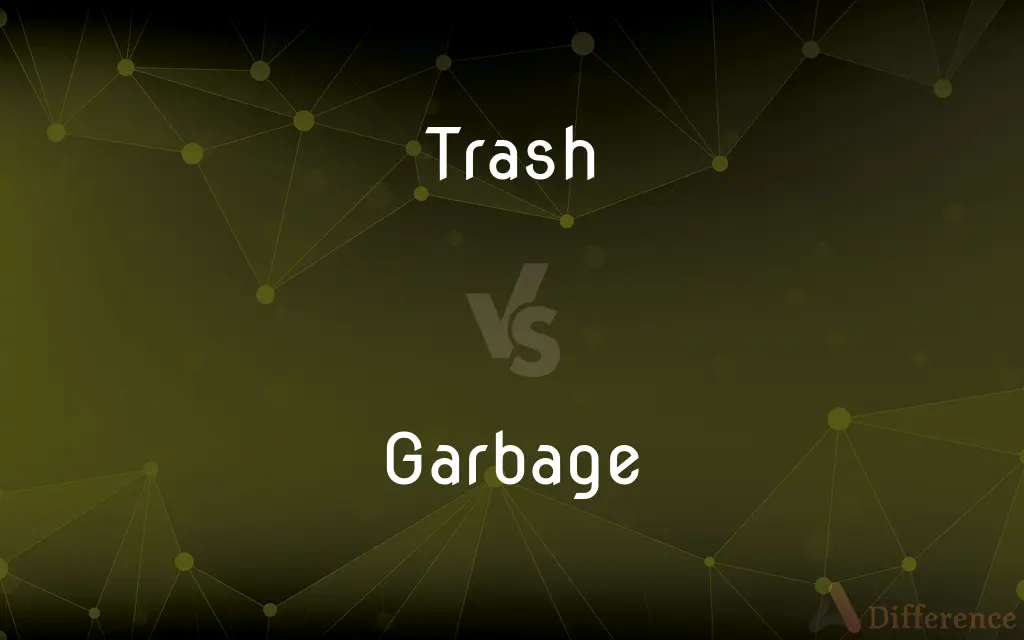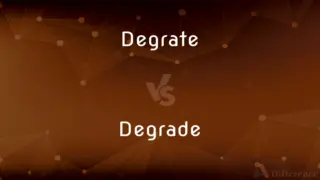Trash vs. Garbage — What's the Difference?
Edited by Tayyaba Rehman — By Fiza Rafique — Updated on September 22, 2023
Trash and garbage are terms often used interchangeably to refer to waste, but they can differ in context. Trash generally refers to dry waste like paper and packaging, while garbage typically refers to wet waste like food scraps.

Difference Between Trash and Garbage
Table of Contents
ADVERTISEMENT
Key Differences
Trash and garbage are two terms commonly used to describe waste materials, though they are not identical in meaning. Trash usually refers to dry waste materials, such as paper, cardboard, and certain types of plastics. Garbage, conversely, is often associated with wet or organic waste, like food scraps or anything that may decompose.
In American English, the terms are often used interchangeably, but distinctions can be important in certain contexts. For example, recycling guidelines may explicitly state which items should go in the trash versus the garbage. Failure to comply with such guidelines can lead to penalties or ineffective waste management.
While trash usually encompasses objects that have lost their value or utility, it can also refer to things of low quality in a metaphorical sense, as in "trash TV" or "trash talk." Garbage does not have as wide a range of metaphorical uses but is primarily focused on items that are not only useless but may also decay or emit a foul odor.
Another nuance is that trash receptacles are often called "trash cans," and these are generally used for dry waste. On the other hand, "garbage cans" are more likely to contain a mixture of both dry and wet waste, including food remnants. In commercial or municipal settings, the distinction may be even more rigorously observed, with separate bins for trash and garbage to aid in recycling or composting efforts.
The terms also vary in usage around the world. In some countries, "rubbish" might be the term for what Americans would call "trash," while the term "garbage" might be less commonly used. Despite these regional differences, the goal remains the same: to categorize and dispose of waste materials efficiently.
ADVERTISEMENT
Comparison Chart
Type of Waste
Usually dry waste
Usually wet or organic waste
Common Usage
American English
American English
Metaphorical Usage
Broader (e.g., "trash talk")
Limited
Typical Receptacle
Trash can
Garbage can
Importance in Recycling
Often separated for recycling
Usually not recycled
Compare with Definitions
Trash
Refers to dry waste material.
The trash bin was full of paper and plastic.
Garbage
Usually not recycled.
Most of the garbage ends up in a landfill.
Trash
Waste material; refuse
The subway entrance was blocked with trash
Garbage
Refers to wet or organic waste.
The garbage bin had food scraps in it.
Trash
A person or people regarded as being of very low social standing
Clubs patronized by rock trash
Garbage
Rarely used metaphorically.
He couldn't believe the garbage he was hearing.
Trash
The leaves, tops, and crushed stems of sugar cane, used as fuel.
Garbage
Typically stored in a garbage can.
Please put the leftovers in the garbage can.
Trash
Damage or destroy
My apartment's been totally trashed
Garbage
Garbage, trash, rubbish, or refuse is waste material that is discarded by humans, usually due to a perceived lack of utility. The term generally does not encompass bodily waste products, purely liquid or gaseous wastes, nor toxic waste products.
Trash
Criticize severely
Trade associations trashed the legislation as deficient
Garbage
Rubbish or waste, especially domestic refuse
A garbage dump
Garbage littered the estate
Trash
Intoxicated with alcohol or drugs
There was booze, but nobody really got trashed
Garbage
Food wastes, as from a kitchen.
Trash
Strip (sugar canes) of their outer leaves to ripen them faster.
Garbage
Refuse; trash.
Trash
Worthless or discarded material or objects; refuse or rubbish.
Garbage
A place or receptacle where rubbish is discarded
Tossed the apple core into the garbage.
Trash
A place or receptacle where rubbish is discarded
Threw the wrapper in the trash.
Garbage
Worthless or nonsensical matter; rubbish
Their advice turned out to be nothing but garbage.
Trash
Something considered worthless or of inferior quality, such as a piece of writing.
Garbage
Inferior or offensive literary or artistic material.
Trash
Disparaging, often abusive speech about a person or group.
Garbage
Food waste material of any kind.
Trash
A person or group of people regarded as worthless or contemptible.
Garbage
Useless or disposable material; waste material of any kind.
The garbage truck collects all residential municipal waste.
Trash
Something broken off or removed to be discarded, especially plant trimmings.
Garbage
A place or receptacle for waste material.
He threw the newspaper into the garbage.
Trash
The refuse of sugarcane after extraction of the juice.
Garbage
Nonsense; gibberish.
This machine translation is garbage
Trash
To throw away; discard
Trashed the broken toaster.
Garbage
Something or someone worthless.
Trash
To damage or wreck, as by vandalism
The house got trashed during the party.
Garbage
(obsolete) The bowels of an animal; refuse parts of flesh; offal.
Trash
To criticize severely or attack verbally
The film was trashed by reviewers.
Garbage
An easy shot.
Trash
To remove twigs or branches from (a tree, for example).
Garbage
To eviscerate
Trash
To cut off the outer leaves of (growing sugarcane).
Garbage
(informal) bad, crap, shitty
Trash
Useless physical things to be discarded; rubbish; refuse.
Garbage
Offal, as the bowels of an animal or fish; refuse animal or vegetable matter from a kitchen; hence, anything worthless, disgusting, or loathsome.
Trash
A container into which things are discarded.
Garbage
To strip of the bowels; to clean.
Trash
Something worthless or of poor quality.
When your life is trash, you don't have much to lose.
Garbage
Food that is discarded (as from a kitchen)
Trash
A dubious assertion, either for appearing untrue or for being excessively boastful.
Garbage
A worthless message
Trash
The disused stems, leaves, or vines of a crop, as well as any weeds mixed therewith, which will either be plowed in as green manure or be removed by raking, grazing, or burning.
Garbage
A receptacle where garbage is discarded;
She tossed the moldy bread into the garbage
Trash
Loose-leaf tobacco of a low grade, with much less commercial value than the principal grades.
Garbage
Often used in American English.
The word 'garbage' is commonly used in the U.S.
Trash
People of low social status or class. See, for example, white trash or Eurotrash.
Trash
A fan who is excessively obsessed with their fandom and its fanworks.
I am Harry Potter trash.
Trash
(computing) Temporary storage on disk for files that the user has deleted, allowing them to be recovered if necessary.
Trash
(US) To discard.
Trash
(US) To make into a mess.
The burglars trashed the house.
Trash
(US) To beat soundly in a game.
Trash
(US) To disrespect someone or something
Trash
To free from trash, or worthless matter; hence, to lop; to crop.
To trash the rattoons of sugar cane
Trash
To treat as trash, or worthless matter; hence, to spurn, humiliate, or crush.
Trash
To hold back by a trash or leash, as a dog in pursuing game; hence, to retard, encumber, or restrain; to clog; to hinder vexatiously.
Trash
That which is worthless or useless; rubbish; refuse.
Who steals my purse steals trash.
A haunch of venison would be trash to a Brahmin.
Trash
Especially, loppings and leaves of trees, bruised sugar cane, or the like.
Trash
A worthless person.
Trash
A collar, leash, or halter used to restrain a dog in pursuing game.
Trash
To free from trash, or worthless matter; hence, to lop; to crop, as to trash the rattoons of sugar cane.
Trash
To treat as trash, or worthless matter; hence, to spurn, humiliate, or crush.
Trash
To hold back by a trash or leash, as a dog in pursuing game; hence, to retard, encumber, or restrain; to clog; to hinder vexatiously.
Trash
To follow with violence and trampling.
Trash
Worthless material that is to be disposed of
Trash
Worthless people
Trash
Nonsensical talk or writing
Trash
Amphetamine used in the form of a crystalline hydrochloride; used as a stimulant to the nervous system and as an appetite suppressant
Trash
Dispose of (something useless or old);
Trash these old chairs
Junk an old car
Scrap your old computer
Trash
Express a totally negative opinion of;
The critics panned the performance
Trash
Often used in American English.
In the U.S., people usually say 'trash' instead of 'rubbish.'
Trash
Can be used metaphorically.
He dismissed the gossip as trash.
Trash
Typically stored in a trash can.
She threw the empty carton in the trash can.
Trash
Commonly separated for recycling.
Make sure to separate your trash for recycling.
Common Curiosities
What does trash usually refer to?
Trash usually refers to dry waste like paper, plastic, and packaging.
Can trash have metaphorical meanings?
Yes, trash can be used metaphorically to refer to things of low quality.
Are the terms trash and garbage interchangeable?
While often used interchangeably, they can refer to different types of waste.
What is the common receptacle for trash?
The common receptacle for trash is a trash can.
What is the common receptacle for garbage?
The common receptacle for garbage is a garbage can.
Is garbage usually recycled?
Garbage, especially wet or organic waste, is usually not recycled.
Do other countries use the term garbage?
The term "garbage" is most commonly used in American English.
Is garbage used metaphorically?
Rarely, garbage is mainly used to describe physical waste.
Is trash usually recycled?
Trash, especially dry waste like paper, is often separated for recycling.
Can trash include plastic waste?
Yes, trash often includes plastic waste like bottles and packaging.
Are there penalties for misclassifying trash and garbage?
Some municipalities may have guidelines and penalties for incorrect waste separation.
What does garbage usually refer to?
Garbage usually refers to wet or organic waste like food scraps.
What's the key difference between trash and garbage?
The key difference is the type of waste: trash is usually dry, while garbage is usually wet or organic.
Can garbage include food waste?
Yes, garbage often includes food waste like scraps and leftovers.
Do other countries use the term trash?
In some countries, the term "rubbish" may be used instead of "trash."
Share Your Discovery

Previous Comparison
Degrate vs. Degrade
Next Comparison
Monarchy vs. PatriarchyAuthor Spotlight
Written by
Fiza RafiqueFiza Rafique is a skilled content writer at AskDifference.com, where she meticulously refines and enhances written pieces. Drawing from her vast editorial expertise, Fiza ensures clarity, accuracy, and precision in every article. Passionate about language, she continually seeks to elevate the quality of content for readers worldwide.
Edited by
Tayyaba RehmanTayyaba Rehman is a distinguished writer, currently serving as a primary contributor to askdifference.com. As a researcher in semantics and etymology, Tayyaba's passion for the complexity of languages and their distinctions has found a perfect home on the platform. Tayyaba delves into the intricacies of language, distinguishing between commonly confused words and phrases, thereby providing clarity for readers worldwide.
















































